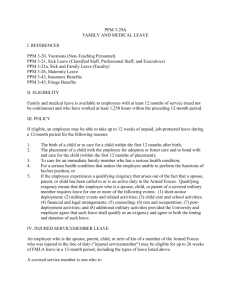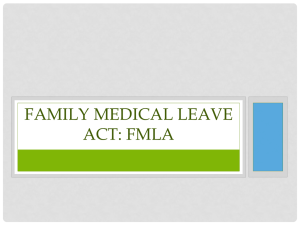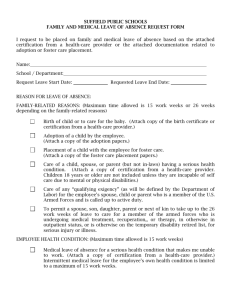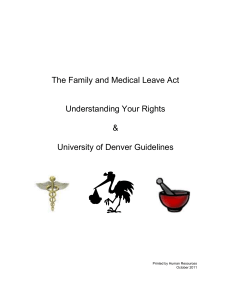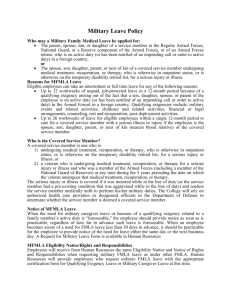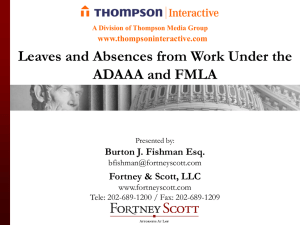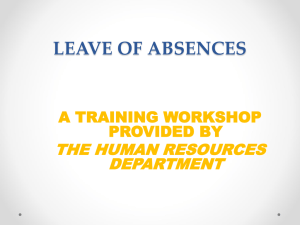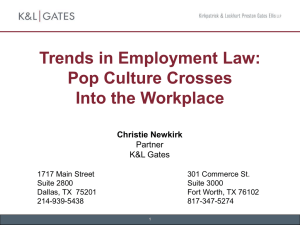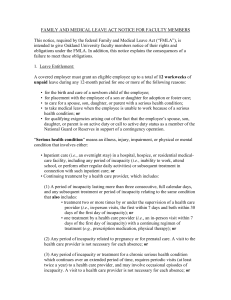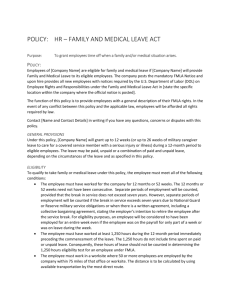Interplay between ADA, FMLA, MN Human Rights Act, and MN
advertisement
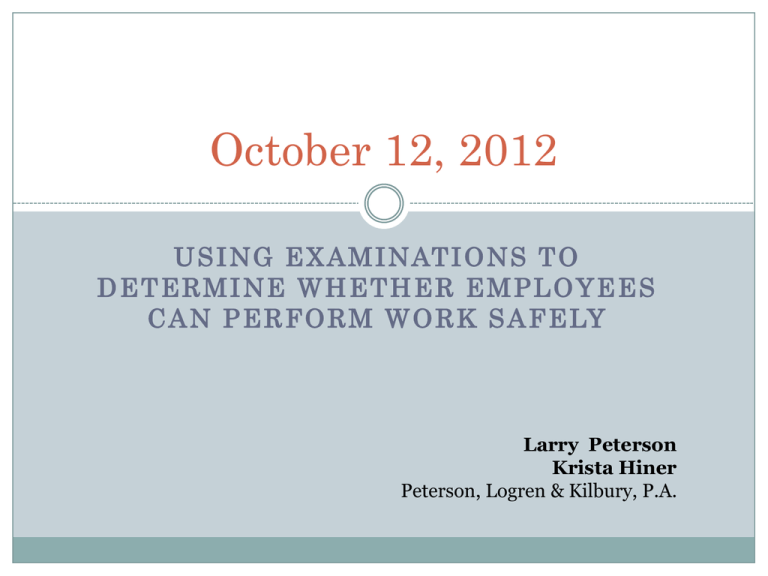
October 12, 2012 U S I N G E X A M I N AT I O N S T O D E T E R M I N E W H E T H E R E M P L O YE E S C A N P E R F O R M W O R K S A F E LY Larry Peterson Krista Hiner Peterson, Logren & Kilbury, P.A. Requiring Employees to Attend Workability Examinations Acceptable in only four situations, generally: 1: Pre-Employment Exams; 2: You have the Employee’s consent; Authority: Minnesota Human Rights Act; Authority: Minnesota Human Rights Act; 3:FMLA Fitness for duty exam; or, 4: Workers’ compensation claim – right to conduct an IME (MSA 176.155 subd.1); Minnesota Human Rights Act “Except for when based on a bona fide occupational qualification, it is unfair to…require or request a person to undergo a physical examination.” (MSA 363A.08 Subd.4) Exams Allowed by MN Human Rights Act “It is not unfair to require a physical exam for the purpose of determining the person's capability to perform available employment provided: conditional job offer has been made….[and the] exam tests only essential job-related abilities.” MSA 363A.20 (subd.8(1)). “With the consent of the employee, after employment has commenced to obtain additional medical information for purposes of assessing continuing ability to perform the job…for purposes of assessing the need to reasonably accommodate an employee…” (MSA 363A.20 (subd.8(2)). Fitness for Duty/Workability Exams Employer has a right to require the employee to produce a medical doctor’s opinion that the employee is able to perform all the physical tasks required before returning from FMLA leave. If you enforced this requirement, then you do not have to return the EE to work before opinion produced. Fitness for Duty Exams Under FMLA Highly regulated: Notify of FFD requirement on designation notice. Attach copy of all physical activities (essential job duties must be listed) to designation notice. You can require FFD certifications only when the employer has a uniformly-applied policy that requires the same of similarly situated employees. You can require them only when they took leave for own condition. FFD certification only for the condition that necessitated the leave. FMLA Medical & FFD Certifications Employee requests FMLA Er can require medical certification to go on FMLA Has right to 2nd opinion If 2nd opinion conflicts with the 1st, can get a 3rd opinion which controls. If you grant FMLA, then you must preserve your right to a Fitness-for-Duty Certification in the designation notice or you lose that right. Preserve your right to Fitness for Duty Certification What to attach to designation notice Attach a list of essential job functions What are the essential job functions? Under the Minnesota Human Rights Act (MHRA), evidence to consider in determining the essential functions of the job may include: (1) the employer's judgment as to which functions are essential; (2) written job descriptions prepared before advertising or interviewing applicants for the job; (3) the amount of time spent on the job performing the function; (4) the consequences of not requiring the incumbent to perform the function; and (5) the current work experience of incumbents in similar jobs. Kammueller v. Loomis, Fargo & Co., C.A.8 (Minn.)2004, 383 F.3d 779. When does FFD certification occur? Needs to be submitted before reinstatement. Can delay reinstatement. If the employee does not provide fitness-for-duty certification, then they are no longer entitled to reinstatement under the FMLA. (29 CFR 825.312(e), 825.313(d).) The employee has until the time the FMLA leave is concluded. (29 CFR 825.313(d).) What if the FFD Certification is Unclear? Contact the health care provider. You are bound to the same rules of communication with the health care provider as you would be under the initial certification. Must advise the employee and allow seven days. If no response, then you can write provider directly Under no circumstances: Delay the employee’s reinstatement pending this clarification May the employee’s direct supervisor contact the physician Ask for additional information outside what FMLA allows Second Opinions Can I get a 2nd opinion instead of clarification? No! Cannot seek a 2nd or 3rd opinion of a fitness for duty! (Unlike the initial leave certification.) They are expressly prohibited under the FMLA. 29 CFR 825.312(b). Exams after Reinstatement Once the employee is reinstated, you cannot have them attend a medical examination for the purposes of evaluating ability to perform job duties unless: 1: You have the consent of the employee; or, (Minnesota Human Rights Act, MSA 363A.20 subd.8(2).) 2: It is an IME performed under Chapter 176. What if Employee Can’t Return to Same Job? If the FFD certification indicates that they can’t return to substantially the same job, but you can infer from the certification that the Employee just requires a reasonable accommodation to perform the task, then you now have a responsibility to evaluate whether you can make that accommodation. You have 20 days. What Constitutes Reasonable Accommodation? "Reasonable accommodation" means steps required to accommodate the known physical/mental limitations of a qualified disabled person. "Reasonable accommodation" may include but is not limited to: (1) making facilities readily accessible to and usable by disabled persons; and (2) job restructuring, modified work schedules, reassignment to a vacant position, acquisition or modification of equipment or devices, and the provision of aides on a temporary or periodic basis. Employees on non-FMLA medical leave Granting non-FMLA leave contingent on employee consenting to a fitness for duty exam when they return; Must grant this leave to similarly situated employees. Scenario #1 59 year old female has such severe asthma and hypertension that she is experiencing shortness of breath. Gives supervisor a doctor’s slip that she cannot walk up and down steps at work more than 1x/hour, must take blood pressure hourly, and is cannot work overtime due to related fatigue. Permanency of restrictions unknown until a regiment of medications are attempted. She works in a four resident group home for the severely physically disabled alongside at least one coworker. She usually works eight hour shifts, but every other weekend works the sleepover shift from 9:00 p.m. Friday evening to 7:00 a.m. Monday morning. During those days she has help for eight hours each on Saturday and Sunday. Scenario #1 (cont’d) If she refuses to be placed on an unpaid 12 week FMLA leave to see if her medical condition improves, can you force her to go onto a FMLA leave? Can you use the ADA rules regarding accommodation and the performance of essential job tasks in answering No. # 1 above i.e. is there a qualifying disability; can some of the essential job tasks be reassigned to someone else; will accommodation require you to hire more help or spend money to make modifications in the job tasks? Given her age, likelihood that her medical condition will continue to decline and her years of service should a severance package along with a resignation be pursued? Scenario #2 The employee has been repeatedly “roughed up” by the residents of your group home. She has had some time loss due to these injuries which have been paid by AmTrust. She does not have a pending and open workers’ compensation claim. She has been talking more and more about changing jobs and being “burned out”. You receive a memo from her counselor that states she cannot work with your clients more than four hours per day and then only if there is at least one other coworker present Scenario #2 (cont’d) Does she qualify for a FMLA leave which would give her some time off to rest, find other work or rejuvenate her “spirit”? Should she be placed on Temporary Partial Disability Benefits by AmTrust and continue to have her work four hours per day? Should you suggest to her that she needs to see a specialist, you will not accept the counselor’s opinions and you will not change her work schedule? Should you do your fitness for duty exam with a qualified and experienced health care provider who is familiar with your business? Scenario #3 The employee was injured at work and has had light duty restrictions for many months. You are trying to give her light-duty work. AmTrust is paying wage loss benefits when you cannot provide light-duty 40 hours/week. The medical treatment seems to be going nowhere. The employee continues to ask doctors for more diagnostic testing. She is disruptive at work when asked to do anything that comes close to exceeding her restrictions. Her workers’ compensation QRC is suggesting a career change and possible retraining. Her workers’ compensation attorney is not interested in pursuing a settlement until the treating doctor says there is no more treatment available and the employee is at MMI. AmTrust is in the process of deciding on doing an IME, but you are not sure you want an IME that says the employee can come back to work because you do not want her back to work. Scenario #3 (cont’d) Put her out on a full FMLA leave and let AmTrust “pay the bill”? You will argue that you do not have permanent light duty work available and it appears her restrictions are permanent. How can you get a fitness for duty without putting her on an FMLA leave and not using up AmTrust’s IME choice? Should you insist that the QRC push for a Functional Capacity Evaluation with a clinic of your choice and then make your employment decisions based upon that outcome? If she is a worthy and hardworking employee do you want to retrain her yourself into another job at your company? Can you just “let her” go without doing the ADA accommodation analysis. She will get Unemployment Compensation benefits if AmTrust does not pay her because their IME says she can be working and she has no restrictions or objective findings. When should you be concerned about a refusal to rehire claim under the treble damages provisions of Minn. Stat. 176.82? Download copy of presentation: plklawfirm.com Questions/contact Larry Peterson: ljp@plklaw.net Krista Hiner: khiner@plklaw.net Phone: 651-647-0506
